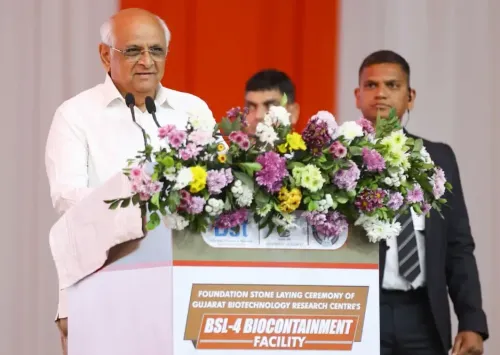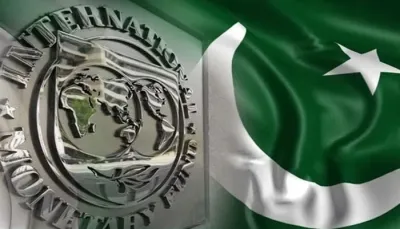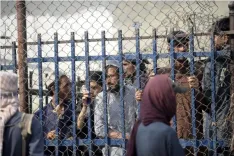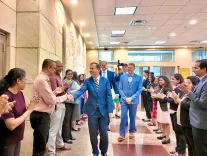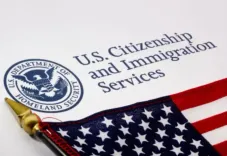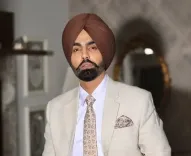How Did Indira Gandhi’s Legacy Shape Human Rights? - Sonia Gandhi
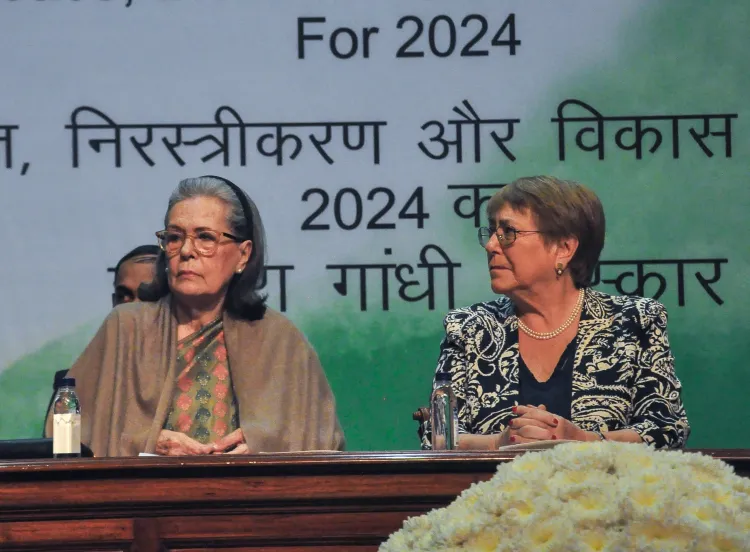
Synopsis
Key Takeaways
- Indira Gandhi was a transformative leader dedicated to human rights.
- The Indira Gandhi Prize recognizes contributions to social development.
- Michelle Bachelet embodies the spirit of Indira’s legacy.
- Collaboration is essential for achieving peace and equality.
- Women’s leadership is crucial for addressing global challenges.
New Delhi, Nov 19 (NationPress) Congress leader Sonia Gandhi on Wednesday honored her mother-in-law Indira Gandhi, describing her as a leader with a compassionate heart, a profound love for her people, a fierce commitment to human rights, and an unwavering faith in non-violence.
“As India’s first and only woman Prime Minister, Indira Gandhi transformed our nation through policies aimed at alleviating poverty, deprivation, conflict, and inequality,” stated the Congress Parliamentary Party chairperson.
Sonia reflected on the former Prime Minister’s legacy while presenting the Indira Gandhi Prize for Peace, Disarmament and Development 2024 to Michelle Bachelet, the former President of Chile and ex-High Commissioner for Human Rights at the United Nations, during a ceremony in Delhi.
Established in 1985, the award “honors Indira Gandhi’s significant contributions by recognizing individuals and institutions engaged in social development, peace, and sustainability,” she noted.
Describing Bachelet as a compassionate leader dedicated to human rights and nonviolence, Sonia, who is also the Chairperson of the Indira Gandhi Memorial Trust, emphasized that Indira’s legacy continues to inspire many.
In her acceptance speech, Bachelet conveyed her gratitude for the award and asserted that peace and progress are inherently linked to human dignity, contending that true human development cannot occur without human rights.
“Let us commemorate Indira Gandhi’s lasting vision by collaborating across nations, generations, and differences to transform peace, equality, and dignity into realities for everyone,” stated the former Chilean President.
Sonia applauded Bachelet as an inspiring leader whose presidency reformed Chile’s healthcare, expanded access to primary care, prioritized policies for vulnerable groups, and advanced health and well-being rights. She noted that legislation passed during Bachelet’s administration fostered equality, rights, and freedom.
“It is a privilege for the Indira Gandhi Memorial Trust to bestow the 2024 Indira Gandhi Prize for Peace, Disarmament, and Development upon President Michelle Bachelet, who embodies the essence of Indira Gandhi’s life and work,” Sonia commented.
Reflecting on Bachelet’s journey, Sonia highlighted that “she experienced loss, oppression, torture, and exile early in her life.”
Observing a striking coincidence, Sonia noted, “Both women were born and raised in tumultuous times, with their countries, families, and themselves suffering from oppression. Madame Bachelet returned to Chile, overcoming challenges while witnessing her nation’s evolution into a democracy.”
Speaking about Bachelet’s achievements, Sonia remarked, “As a trained medical professional, she served in the Ministry of Health, became the Health Minister in 2000, and broke barriers to become Chile and Latin America’s first female Defense Minister, making history when she was elected President twice.”
Sonia recalled how “her influence reached beyond Chile and Latin America when she became the inaugural director of the UN Women Agency in 2010 and later served as the United Nations High Commissioner for Human Rights.”
Emphasizing that Bachelet’s work is founded on advocating for all rights, particularly for women, Sonia reiterated her words: “We can no longer afford to overlook the full potential of half the population. The world must harness the talent and wisdom of women. Whether it’s about food security, economic recovery, health, or security, women’s involvement is more crucial than ever.”
Sonia also commended her presidency, where “she revamped her country’s healthcare system, enhancing access to primary care for vulnerable groups, including survivors of sexual abuse, and advocating for their rights to health and well-being. She also improved the conditions for women in the military and police.”




